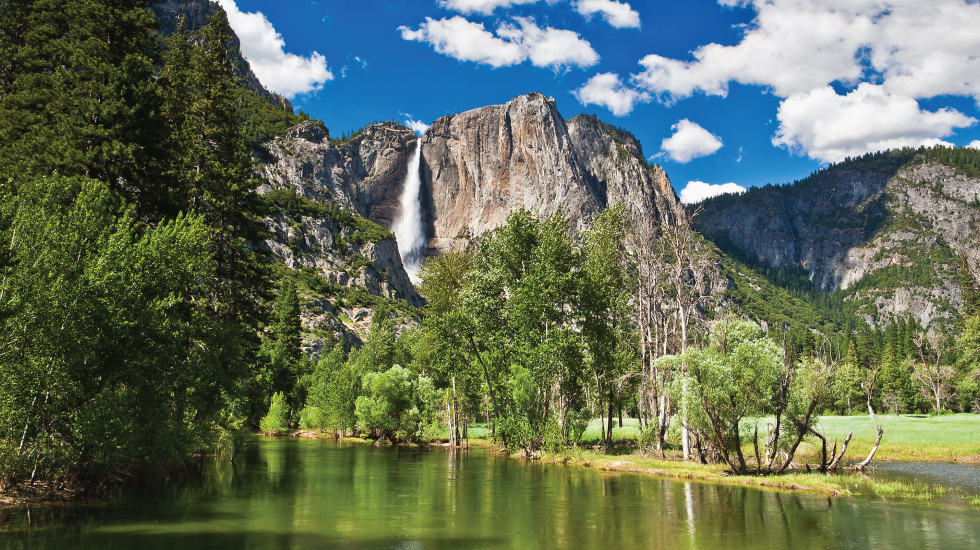
Inspired by Stephen D. Bechtel, Jr. and his love of nature, the Foundation envisioned a California that manages, stewards, and conserves its water and land to support a resilient environment and healthy communities. The Environment Program was imbued with experience derived across decades of Foundation grantmaking on topics dear to Mr. Bechtel – including habitat preservation, science and engineering, and environmental education.
The California Conservation Fund, a charitable operating foundation established by Stephen D. Bechtel, Jr. in 2000, provided a laboratory for deep learning. Its strategies to preserve waterfowl habitat were well-timed to influence the Environment Program’s priority focus on water and land in the Foundation’s spend-down years. The California Conservation Fund’s work highlighted the importance of policy reform, research, and capacity building as vehicles for achieving habitat protection and restoration. It showed how water and land issues are intertwined, spoke to the need to engage all stakeholders as vital participants in creating solutions, and pointed to the responsibility of funders to sustain, and adapt, support over the long term. The Foundation incorporated these lessons into strategies shaped to support the broad range of actors – communities, farmers, nonprofits, government agencies, and others – who steward water and land resources.
Partnering to improve systems
California’s water and land management challenges are daunting – highly textured yet subject to siloed actions and outcomes that divide winners and losers. The Foundation team approached this work with inherent optimism, conviction that problems defined can become problems solved, and commitment to developing trust-based relationships with leaders throughout California.
The Foundation’s process for molding and honing strategies was deliberately fluid – continually recalibrated to the shifting realities of grantees and fields and spurred forward through action in moments that invited change. Over the arc of the spend down it seemed that every day carried surprise, challenge, and opportunity. Our approach relied on setting broad goals and investing in organizations that could tack to address what was ripe in the moment, or necessary in the big picture. Foundation board member Jude Laspa described this overarching practice as working with a “constancy of purpose.”
We shared in the joy our partners earned through system-shifting accomplishments. Water grantees were change agents in reforming groundwater management in California, reducing flood risk in the Central Valley, advancing access to quality drinking water as a right for all Californians, demonstrating that a massive region such as Los Angeles County can build green infrastructure, and attracting significant new funding to water projects. Partners in the land portfolio helped ensure that California’s remarkable state parks will be meaningful to all residents for generations to come, proved the benefits and elevated the practices of large-scale landscape management, strengthened networks of land trusts and Resource Conservation Districts as essential assets, and established a state program to expand regional conservation strategies.
We invite you to read more about the Foundation’s environment grantmaking:
- Water portfolio strategy snapshot, staff reflections
- Land portfolio strategy snapshot, staff reflections on protected lands, staff reflections on new tools for conservation
- Environment strategies for capacity building
- Community Foundation Water Initiative snapshot
- Environmental evaluation essay
Outlook and opportunities
We celebrate our partners’ accomplishments while recognizing that, as this Foundation closes, there remains much to do. Climate change is occurring at a rate that exceeds social, economic, and political responses. California can expect more fires, droughts, and floods. The state’s housing, transportation, and health needs all intersect with water management, land use, and wildlife conservation. Demands for equitable solutions and ending racism call for revamping how environmental decisions are made, and by whom.
These circumstances increase the need for holistic, integrated, inclusive approaches to addressing water and land issues. The environment field is tasked with enormous responsibility, but it is thinly resourced; many organizations operate largely with funding that is project-to-project. If nonprofits are to be resilient, relevant, and responsive in the face of current as well as yet-unimagined environment challenges, more funders must be willing to commit to substantial, multi-year support.
Still, the progress and promise of our partners create bright spots as we look beyond 2020. The fields of water and land have greater research capacity, vibrant connections, promising collaborations, effective anchor organizations, and leaders equipped to work across sectors and across differences.
This Foundation used its spend down as an opportunity to make big bets and pursue durable change to the systems that shape how California preserves nature and wildlife, provides drinking water, produces food, prevents devastating wildfires, reduces carbon emissions, and pursues other vital goals. We have learned that this state has the human, intellectual, and financial capital to manage water and land in ways that work for people and nature. We know that philanthropy can make a difference in so many ways, including accelerating inclusion, seeding innovations, nurturing collaborations, scaling solutions, and stabilizing fields.
We extend full-hearted gratitude to the grantees, funders, and other partners who have worked so diligently, and inventively, to address water and land challenges that carry high stakes for current and future generations of Californians. It has been a privilege to grow alongside such energetic networks, thoughtful organizations, and dedicated individuals over the course of the Foundation’s sunset. Your spirit and insights gave us energy and belief in new possibilities – and will produce great achievements for decades to come.
Joya Banerjee
Director, Environment Program
